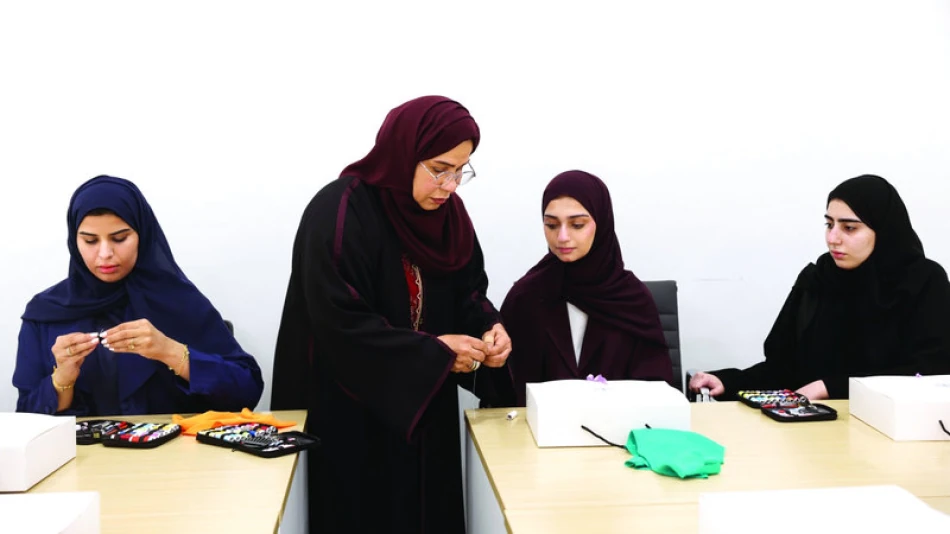
Girls of 'Summer Grass' Learn Crafting, Hospitality, and Feminine Arts
Dubai's Cultural Summer Program Bridges Traditional Heritage with Modern Youth Development
Dubai's Department of Islamic Affairs and Charitable Activities is running an ambitious summer program that combines traditional Emirati crafts with contemporary leadership skills for young girls. The "Ghiras Summer 2025" initiative targets ages 7-15, offering everything from henna art and traditional cooking to decision-making workshops—a strategic approach to cultural preservation that other Gulf states are increasingly adopting.
Beyond Summer Camp: A Blueprint for Cultural Continuity
The program represents more than typical vacation activities. Girls learn traditional Emirati hospitality customs, master heritage crafts like "Talli" embroidery, and prepare classical dishes including "Balaleet" and "Khabisa." Simultaneously, they develop leadership competencies through group projects and decision-making exercises.
Eleven-year-old Mahra Khalid described finding "an enjoyable educational environment that develops skills like drawing and sewing," while 10-year-old Alia Al-Shamri highlighted henna painting and home gardening workshops as particularly engaging.
Strategic Youth Investment
Ahmed Darwish Al-Muhairi, Director General of Dubai's Department of Islamic Affairs, emphasized the program's focus on "Emirati Sana'a"—traditional craftsmanship and cultural practices. This approach aligns with broader UAE initiatives to strengthen national identity among younger generations increasingly influenced by global digital culture.
Noura Amiri, Executive Coordinator at the department, explained the program's dual mission: "We aim to enhance girls' belonging to their homeland while establishing balance between today's digital world and authentic values."
Volunteer-Driven Model Creates Multiplier Effect
The program leverages young volunteers and students from the Al-Mazhar Islamic Cultural Center, creating a peer-to-peer learning environment. Sixteen-year-old twins Hoor and Ghazlan Al-Bustaki supervised handbag accessories workshops, while student Maryam Al-Falasi organized "My Mother Mouza's Majlis"—a section dedicated to traditional and modern Emirati hospitality.
This volunteer structure serves dual purposes: experienced participants develop mentoring skills while younger girls receive relatable guidance from near-peers rather than adult instructors exclusively.
Regional Context and Growing Trend
Dubai's approach mirrors similar cultural preservation efforts across the Gulf region. Saudi Arabia's Vision 2030 includes extensive heritage programs, while Qatar has invested heavily in traditional arts education since hosting the World Cup. The UAE's model stands out for its integration of leadership development with cultural learning.
Addressing Digital-Era Challenges
The program directly confronts concerns about cultural erosion among youth immersed in global digital platforms. By teaching traditional crafts alongside modern skills, organizers attempt to make heritage relevant rather than obsolete.
The "Talli" embroidery workshops exemplify this approach—participants learn centuries-old techniques while creating contemporary accessories, demonstrating how traditional skills can adapt to modern contexts.
Investment in Future Leadership
The program's emphasis on leadership development reflects broader UAE strategies to prepare young women for expanded roles in the country's diversifying economy. Participants practice group decision-making and collaborative problem-solving alongside cultural activities.
This combination addresses practical workforce development needs while maintaining cultural continuity—a balance that other rapidly developing nations struggle to achieve. The program's success could provide a replicable model for countries seeking to preserve traditional identity while preparing youth for globalized careers.
By investing in cultural education during formative years, Dubai positions itself to maintain distinct national character as it continues expanding as a global business hub. The program's volunteer structure also creates sustainable knowledge transfer mechanisms that can operate independently of government resources.
Most Viewed News

 Sara Khaled
Sara Khaled






